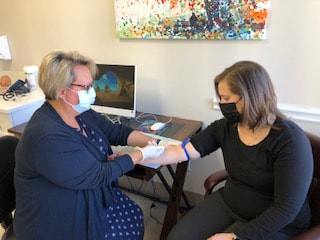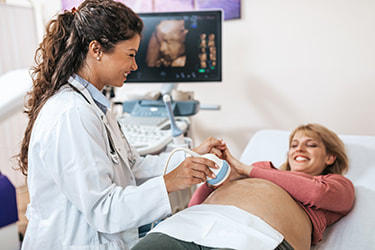
All tests are optional although many are recommended. Your midwife will have an informed choice discussion with you to help you decide which testing is right for you and your family.
Your midwife will order the ultrasounds you choose to have. They are conducted off-site in medical imaging clinics or the hospital; there are various imaging locations around the city. We will schedule you close to home whenever possible. The second trimester ultrasound is always done at the hospital if possible.
Your midwife will order any blood work you need. Sometimes they may need to consult with a physician to order non-routine blood tests which are outside the scope of midwifery. The midwife can draw your blood in the clinic, or you can have it taken off site at a medical laboratory such as LifeLabs or Gamma Dynacare.
We order and collect urine, swabs and pap smears in our clinic.
Your midwife will order the ultrasounds you choose to have. They are conducted off-site in medical imaging clinics or the hospital; there are various imaging locations around the city. We will schedule you close to home whenever possible. The second trimester ultrasound is always done at the hospital if possible.
Your midwife will order any blood work you need. Sometimes they may need to consult with a physician to order non-routine blood tests which are outside the scope of midwifery. The midwife can draw your blood in the clinic, or you can have it taken off site at a medical laboratory such as LifeLabs or Gamma Dynacare.
We order and collect urine, swabs and pap smears in our clinic.
Testing in early pregnancy:
Ultrasounds:

We recommend a dating ultrasound in the first trimester to give us a better idea of the baby’s due date. This becomes especially important if you go into labour before you are full term or if we are planning for a possible induction at the end of pregnancy. It is important to have an accurate idea of the baby’s gestational age at each stage of pregnancy.
- You will be offered a Nuchal Translucency ultrasound (or NT scan) between 11-13 weeks. This scan can be combined with the dating ultrasound. The NT scan measures the fluid at the back of the baby’s neck, which can signal a possible abnormality or differences in the baby if there is an increased amount. This ultrasound is a component of genetic screening (see below for more info) to see if your baby has an increased risk of genetic or chromosomal differences. This ultrasound is part of the enhanced First Trimester Screen (eFTS) and is recommended if you choose to have non-invasive prenatal testing (NIPT or NIPS) as well.
Routine blood tests:
- CBC (complete blood count). This gives us information on the overall health and oxygen-carrying capacity of your blood.
- Group and Screen. This tells us your blood type such as A+ or B- for example, and also looks for any antibodies that may be harmful to your baby in pregnancy or early infancy.
- HIV (Human Immunodeficiency Virus). This virus compromises the immune system and needs to be treated. The medication used to treat HIV significantly decreases the likelihood that a pregnant person passes the virus on to their baby. Prognosis for people who get treatment is excellent and we can almost completely prevent transmission to baby with the same medications.
- Hepatitis B (Hep B). This virus damages the liver and is transmitted through body fluids. If you have active Hep B we will consult with a physician to monitor your liver function during pregnancy. The babies of chronic Hep B carriers have access to immune therapy and a vaccine soon after birth to prevent transmission.
- Syphilis. This is a bacterial infection caused by sexual contact that can also be passed from a pregnant person to their fetus. It is treatable but very serious if left untreated and is very harmful to babies born with it.
- Rubella immunity. Rubella is a virus that can be very harmful to the developing fetus. If a pregnant person is not immune to Rubella in pregnancy, they must try to avoid catching the virus. The virus is usually passed along by unvaccinated children. You will be offered a vaccine booster after the birth if you are not immune.
Other routine tests:
- Chlamydia and Gonorrhea are bacterial infections caused by sexual contact which can infect the baby as it passes through the birth canal. It can cause problems for both adults and newborns but it is easily treated. Testing for Chlamydia and Gonorrhea can be done on a pap smear sample, with a urine test or a vaginal swab which can be collected by the midwife or by yourself.
- Urinary Tract Infections (UTI). In pregnancy, there is a higher chance of having infection-causing bacteria in your bladder that do not cause symptoms. If there is an infection in the urine in early pregnancy, it may cause a more serious infection in later pregnancy which can lead to pre-term labour. These infections can be treated with antibiotics.
- Pap smear. This is the test to look for cervical changes at the cellular level that can indicate that cervical cancer is developing. People with a cervix over the age of 25 who are sexually active should have a pap test at least every 3 years (more often in some cases). If you are due for a pap, it is safe to do in pregnancy and we can do that for you at one of your routine appointments.
Genetic Screening:
You can chose to have testing to see if your baby has an increased chance of having Down Syndrome (Trisomy 21) or other chromosomal differences such as Trisomy 13 or 18. People with Down Syndrome have developmental delay and have a higher chance of certain health concerns. With appropriate medical treatment, most can lead healthy lives and the life expectancy is now 60 years on average. You can read about it here: https://cdss.ca/resources/general-information/
Trisomy 13 and 18 are not survivable conditions. This means that babies with these chromosomal arrangements are not likely to survive pregnancy until birth and if they do, are not able to live very long.
Many parents choose to have a screening test to see if there is a high or low chance that their baby may have one of these chromosomal differences. These tests are not diagnostic which means they don’t tell you if the baby has these conditions, they just tell you if the chance is high or low. If the chance is low, testing does not go any further. If the chance is high (more than 1 in 350), you are offered further testing which is diagnostic to find out if the baby does have one of these syndromes. You can read more about these tests here: https://prenatalscreeningontario.ca/en/pso/about-prenatal-screening/about-prenatal-screening.aspx
Trisomy 13 and 18 are not survivable conditions. This means that babies with these chromosomal arrangements are not likely to survive pregnancy until birth and if they do, are not able to live very long.
Many parents choose to have a screening test to see if there is a high or low chance that their baby may have one of these chromosomal differences. These tests are not diagnostic which means they don’t tell you if the baby has these conditions, they just tell you if the chance is high or low. If the chance is low, testing does not go any further. If the chance is high (more than 1 in 350), you are offered further testing which is diagnostic to find out if the baby does have one of these syndromes. You can read more about these tests here: https://prenatalscreeningontario.ca/en/pso/about-prenatal-screening/about-prenatal-screening.aspx
- eFTS (enhanced First Trimester Screening). A combination of an ultrasound (NT scan) and a blood test done between 11-13 weeks. This test is free and can be ordered by the midwife. The blood test measures certain substances in the parent’s blood that are released either by the fetus or the placenta that can give clues on the health of the pregnancy. The test considers the blood and ultrasound findings as well as other factors such as weight, race, and smoking status. The test result will be either negative / low risk, or positive/high risk. A negative result means
the chance that the baby has one of these chromosomal differences is 1 in 351 or lower. A positive/ high risk result which means the chance is 1 in 350 or higher. Those with a positive/high risk screening result will be offered further testing.
Learn more about this test here: https://prenatalscreeningontario.ca/en/pso/about-prenatal-screening/enhanced-first-trimester-screening-efts.aspx - MSS (Maternal Serum Screen). This test is done from 14-20 weeks for those who missed the opportunity for eFTS and want free genetic screening. The test is very similar to eFTS but can be done with or without the NT ultrasound. Results are less reliable than the eFTS. More pregnancies that are affected by chromosomal differences will receive a low risk result and more pregnancies where the baby’s chromosomes are arranged in the typically way will screen positive with this test. If possible, eFTS or NIPT/NIPS are better options. MSS is free and can be ordered by the midwife.
Learn more about this test here: https://www.prenatalscreeningontario.ca/en/pso/about-prenatal-screening/maternal-serum-screen-mss.aspx - Non-Invasive Prenatal Testing or Screening (NIPT or NIPS). This test is 99.9% accurate at predicting whether the developing fetus has Down Syndrome or certain other differences. It is a blood sample taken from the pregnant person that finds fragments of fetal DNA to gather information about the baby’s chromosomal pattern. This test is available for free to those with OHIP aged 40 or over on their due date and to people who screen positive on the eFTS or MSS. If you qualify for OHIP-funded testing and you with to proceed, the midwife will arrange for a physician to order the test for you. All clients can self-pay to have this test (even those under 40 and those without a positive eFTS or MSS result). The Hamilton Midwives has partnered with a genetic testing provider called Invitae to offer low cost NIPS to our clients. The cost is $99US. Your midwife can order the test if you choose to have it and self-pay.
You can look up Invitae here: https://www.invitae.com/en/pregnancy
Learn more about NIPT here: https://prenatalscreeningontario.ca/en/pso/about-prenatal-screening/non-invasive-prenatal-testing.aspx
Other tests in early pregnancy:
Your midwife may discuss other testing with you that is not routine but may be indicated in your particular situation. If you decide to have any of these tests, the midwife will order them if they are within the midwifery scope of practice, and if not, consult with a physician such as your family physician, a local walk-in clinic or an obstetrician to get the order.
Second trimester ultrasound (the Anatomy Scan):
The best time to look at the baby’s body parts and organs to see if there are any abnormalities (possible birth defects) that need follow up is 18-22 weeks. Looking for soft markers (warning signs) for genetic differences is also part of this test. Soft markers do not necessarily mean your baby has an abnormality but they are flags for your midwife to review your case closely, to see if you need any additional consultations or follow up.
This ultrasound also looks at the location of your placenta. The placenta is the organ that grows inside the uterus along with the baby and transfers all the nutrients and oxygen from the parent to the baby. It also takes the baby’s waste away. When it is time for the baby to be born, the placenta should not be too close to the cervix or it can cause problems with bleeding or even prevent a vaginal birth. Early on in pregnancy, it is normal for the placenta to be close to the cervix. Usually the placenta is drawn up towards the top of the uterus at it grows and you get further along in pregnancy. If your placenta is close to the cervix during your second trimester scan, your midwife will discuss this with you. The midwife will discuss warning signs for you to be aware of and plan for a follow up ultrasound later in pregnancy.
This ultrasound can also determine the baby’s sex if the parents wish to know and the baby is cooperative. We schedule second trimester ultrasounds at St Joseph’s hospital in the Fontbonne building.
Ultrasound is not a perfect technology. The sound waves need to go through all of your layers to get to the baby and then through the baby’s layers to get to their organs. Sometimes the technician can’t get all the views they need and you may choose to go back for a second look. This is called missed views. Sometimes you are told that your baby could have an abnormality but in fact is formed normally and born with no health concerns. Sometimes you are told that your ultrasound is normal but the baby is born with an issue we did not foresee. Some abnormalities cannot be seen on ultrasound or can’t be seen before birth. Although it is not perfect, it is a very useful tool.
Your midwife will discuss this ultrasound with you and order if for you if you want it. We do recommend it.
This ultrasound also looks at the location of your placenta. The placenta is the organ that grows inside the uterus along with the baby and transfers all the nutrients and oxygen from the parent to the baby. It also takes the baby’s waste away. When it is time for the baby to be born, the placenta should not be too close to the cervix or it can cause problems with bleeding or even prevent a vaginal birth. Early on in pregnancy, it is normal for the placenta to be close to the cervix. Usually the placenta is drawn up towards the top of the uterus at it grows and you get further along in pregnancy. If your placenta is close to the cervix during your second trimester scan, your midwife will discuss this with you. The midwife will discuss warning signs for you to be aware of and plan for a follow up ultrasound later in pregnancy.
This ultrasound can also determine the baby’s sex if the parents wish to know and the baby is cooperative. We schedule second trimester ultrasounds at St Joseph’s hospital in the Fontbonne building.
Ultrasound is not a perfect technology. The sound waves need to go through all of your layers to get to the baby and then through the baby’s layers to get to their organs. Sometimes the technician can’t get all the views they need and you may choose to go back for a second look. This is called missed views. Sometimes you are told that your baby could have an abnormality but in fact is formed normally and born with no health concerns. Sometimes you are told that your ultrasound is normal but the baby is born with an issue we did not foresee. Some abnormalities cannot be seen on ultrasound or can’t be seen before birth. Although it is not perfect, it is a very useful tool.
Your midwife will discuss this ultrasound with you and order if for you if you want it. We do recommend it.
Tests in 2nd and 3rd trimester:
Your midwife will discuss these tests with you and order them if you want them:
- Glucose screening for gestational diabetes at 24-28wks
- Complete blood count from 32-36 wks may be offered
- Repeat antibodies may be offered at around 28wks
- Group B Strep vaginal/rectal swab at 35-37wks
- Third trimester ultrasound(s) if indicated
|
Office hours
Share Us on:
|

The Hamilton Midwives
25 Charlton Avenue East, Unit 600 |
© 2024 The Hamilton Midwives - hamiltonmidwives.ca All Rights Reserved.
